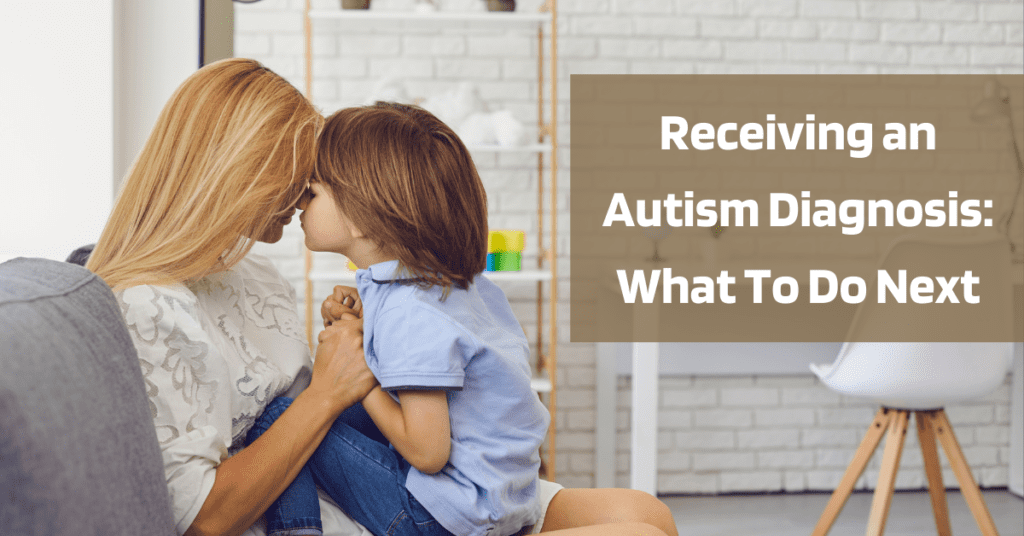
You’ve just received an autism diagnosis for your child. You may be feeling a mix of emotions, from shock, fear, guilt, overwhelm, confusion, or perhaps relief and clarity. Whatever may be going through your mind, know that you are not alone in this journey. You are one of thousands of parents navigating the reality of having a child with autism. This journey brings both joy and struggle, and we are here to help you through it.
In the meantime, here are some helpful steps to take.
Learn about ASD
According to recent 2021 findings by the CDC, 1 in 44 children are diagnosed with Autism Spectrum Disorder (ASD). ASD can cause social, communication, and behavioral challenges. Yet symptoms of autism greatly differ from person to person.
Social
Social challenges within ASD may include making eye contact, lack of recognition of nonverbal cues, lack of emotional facial expressions and obsessive interests.
Communication
Communication challenges may include difficulty developing language skills, understanding others, slower tempo of speech, and making appropriate facial expressions.
Behavioral
Behavioral challenges may include repetitive behaviors such as hand flapping or rocking, sensory processing issues, aversion to touch, rigidities in routines, emotional meltdowns, refusal to follow demands, and self-injurious behavior.
In addition to the above, children diagnosed with autism may also struggle with fine and gross motor skills, such as balance and grasping objects. This can also lead to difficulty acquiring daily living skills like dressing, brushing teeth, writing and more.
If you are just learning about autism or want to continue educating yourself, check out these autism education and awareness organizations:
Autism Alliance of Michigan https://autismallianceofmichigan.org/
National Autism Association https://nationalautismassociation.org/
Find support for yourself
Receiving an autism diagnosis can cause stress and worry in parents. It’s crucial to get support for yourself and your partner if you are going through this journey together.
Some ways to ensure you have support include:
- Reach out to other parents of children with ASD to hear how they have navigated their journey
- Taking time to process for yourself or with your partner. Maybe have someone watch your child(ren) so you can have space to take in the news of the diagnosis, sift through any information you’ve received, and formulate questions for medical professionals and autism specialists.
- Seek counseling to help you process. At Healing Haven, we help parents process their child’s diagnosis through our counseling program. In counseling, parents identify triggers for stress, develop goals to manage stress, and learn to navigate relationships. Additionally, we have an ABA Parent Training program, created by our director, Jamie McGillivary. In this program, parents acquire stress management techniques while learning principles of ABA to help support their child’s development.
- Find autism parent support groups in your area by searching Facebook or visit the Autism Alliance of Michigan website for resources.
Seek therapeutic help for your child
Once a child is diagnosed, the evaluation team will often recommend various therapies to support the child’s development. It is important to check with your insurance plan to see what coverage your plan has for an autism diagnosis. The most common therapies recommended include the following:
Applied Behavior Analysis (ABA) Therapy
ABA focuses on developing social, communication, play and learning skills through positive reinforcement. ABA is one of the most common therapies used in autism treatment and is backed by 50 years of research. At Healing Haven, we provide high quality ABA therapy in our clinics. We believe in a more natural and holistic approach to help the child carry over what they are learning into other settings. We also leverage incidental teaching, utilizing the child’s natural interests and motivations.
Occupational Therapy (OT)
The goal of Occupational Therapy is to increase skills in daily living and the use of everyday objects (such as eating and drinking, dressing, writing, etc.) Benefits of OT for individuals with autism include sensory processing, focus, emotional expression, and independence in everyday tasks.
Speech Therapy
Speech Therapy treats speech and communication disorders. It is incredibly beneficial for those with autism, as ASD contains a wide range of communication abilities, from nonverbal to extremely verbal and talkative. Speech Therapy helps individuals communicate through picture icons, electronic talking devices, reading body language, asking and answering questions, and grammatically correct sentences.
Counseling
Some children and teens diagnosed with autism do not require more intensive ABA Therapy. However, they could benefit from individual counseling. This provides a space for those with ASD to process life challenges. In counseling, individuals with autism meet with a certified therapist specially trained in ASD issues. ASD clients learn coping strategies for frustration or anxiety, manage sensory processing issues, and developing social skills.
Create structure for your child
Individuals with autism function well within structured environments. If you haven’t already done so, start creating predictability for your child’s day.
Make a visual schedule for your child to refer to if they are anxious about what will come next in their day. You could fill it out together the night before or in the morning, for instance. There are hundreds of ideas and templates for creating fun, kid-appealing visual schedules. (Try these free printables!)
Another way to help your child with structure is giving time warnings before an activity ends. For example, if your child is engaging in play with a preferred toy or activity, give 15, 10, and/or 5 minute warnings. Setting timers might be helpful as well. This helps your child be aware that change is coming. They will also learn to emotionally regulate better with a heads-up, especially if sudden change can trigger meltdowns.
As mentioned before, you are not alone in this journey of raising a child with autism. Above all, the most important thing you can do is make sure both you and your child get the support needed. And it’s our team’s mission at Healing Haven to provide you that support. We are in your corner.
For more information, be sure to check out these blogs!
6 Ideas for Practicing Social Skills with Autistic Children
Communication and Autism: 4 Resources to Help
The Benefits of Organized Space for Individuals With Autism
